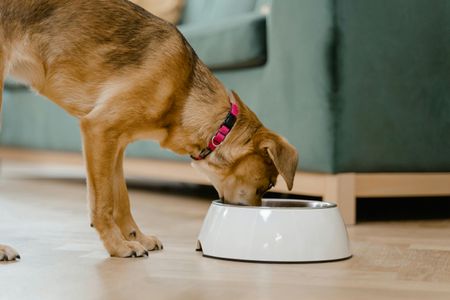Healthy Dog Diet: A Complete Guide to Keeping Your Pup Fit and Happy
 Ibelu Ibelu
02 May, 2025
11 mins read
48
Ibelu Ibelu
02 May, 2025
11 mins read
48

Healthy Dog Diet: A Complete Guide to Keeping Your Pup Fit and Happy
Feeding your dog isn’t just about scooping kibble into a bowl. It’s about giving them a balanced, nutritious, and appropriate diet that suits their specific needs. A healthy dog diet plays a vital role in ensuring your pup lives a longer, happier, and more active life.
Let’s dig into what makes up a truly healthy diet for dogs and how to tailor it for different lifestyles and Dog Breeds.
Why a Healthy Diet Matters
Just like humans, dogs thrive on a balanced and nutrient-rich diet. It supports their immune system, maintains a shiny coat, strengthens their bones, and helps them stay energetic and alert. A poor diet, on the other hand, can lead to obesity, heart disease, diabetes, and a shortened lifespan.
What Does a Healthy Dog Diet Include?
1. High-Quality Protein
Protein should be the backbone of your dog’s diet. It builds strong muscles and supports healthy skin and hair. Look for dog food where real meat is listed as the first ingredient.
2. Healthy Fats
Fats aren’t the enemy—they're essential. Omega-3 and omega-6 fatty acids help your dog maintain a shiny coat and reduce inflammation.
3. Complex Carbohydrates
Dogs don’t need carbs in large amounts, but whole grains like brown rice, barley, and sweet potatoes provide fiber and energy.
4. Essential Vitamins and Minerals
These help with everything from bone health to vision. Dogs need a mix of calcium, iron, magnesium, zinc, and more.
Tailoring the Diet by Dog Breeds
Different breeds have different dietary needs. For example:
- Small breeds like Chihuahuas need calorie-dense food due to their high metabolism.
- Large breeds like Great Danes need food that supports joint health and prevents rapid growth.
- Active breeds like Border Collies or Huskies need high-protein and high-fat diets for sustained energy.
Choosing the right food for your dog’s breed can make a huge difference in their overall health and behavior.
Homemade vs. Commercial Dog Food
While homemade meals give you full control over ingredients, they must be carefully balanced. On the other hand, high-quality commercial dog foods are formulated to meet nutritional standards.
If you go homemade, consult a vet or canine nutritionist. If you buy commercial food, make sure it’s labeled as “complete and balanced.â€
Raw Diets: Are They Safe?
Raw food diets have become trendy, but they’re not for every dog. While some owners swear by the results, raw diets can carry bacteria like Salmonella and may lead to nutritional imbalances if not managed carefully.
Always do thorough research and talk to your vet before switching your dog to raw food.
Foods to Avoid
Even if it looks tasty to you, many human foods can be dangerous for dogs. Keep your pup far away from:
- Chocolate
- Grapes and raisins
- Onions and garlic
- Alcohol
- Xylitol (found in sugar-free gum and snacks)
Nutrition Tips for a Healthier Pup
Want to give your dog a longer, happier life? Here are some key nutrition tips:
- Stick to a feeding schedule to avoid overeating.
- Measure portions based on your dog’s weight and activity level.
- Always provide fresh, clean water.
- Choose high-quality treats, and use them sparingly.
- Keep an eye on their weight and energy levels.
For more guidance, check out these expert Nutrition Tips.
Puppies vs. Adult Dogs vs. Seniors
- Puppies need extra calories and nutrients to support rapid growth.
- Adult dogs need balanced maintenance diets.
- Senior dogs often require fewer calories but more supplements like glucosamine for joint health.
Feeding your dog according to their life stage is crucial to keeping them healthy at every age.
Does Activity Level Matter?
Absolutely! A working dog or an agility competitor will burn more calories and need more protein and fat than a couch-loving companion. Always adjust your dog’s diet based on how active they are.
Conclusion
Picking the right food for your furry friend can be tricky, but with Iblue, it’s simple and stress-free By feeding your dog the right balance of nutrients, tailored to their breed, age, and lifestyle, you can give them the vibrant and healthy life they deserve.
Don’t rely on guesswork—educate yourself, read labels, and ask your vet when in doubt. Your dog can’t choose what’s in their bowl, but you can. Make it count.
FAQs
1. How do I know if my dog is on the right diet?
Watch for energy levels, stool consistency, coat condition, and overall mood. If in doubt, consult a vet.
2. Are grain-free diets better for dogs?
Not always. Unless your dog has a grain allergy, whole grains can be beneficial.
3. Can dogs eat fruits and vegetables?
Yes! Carrots, apples (no seeds), and blueberries are great in moderation.
4. How often should I change my dog’s food?
Only switch when needed—like changes in age, health, or activity. Gradually introduce new food over a week.
5. Should I give my dog supplements?
Not unless advised by a vet. Too much of a good thing can lead to imbalances.
Written By:
Ibelu Ibelu



Hotels at your convenience
Now choose your stay according to your preference. From finding a place for your dream destination or a mere weekend getaway to business accommodations or brief stay, we have got you covered. Explore hotels as per your mood.





